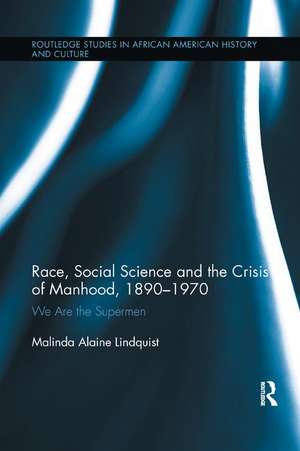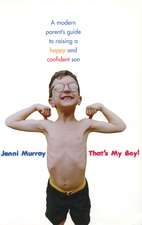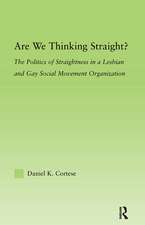Race, Social Science and the Crisis of Manhood, 1890-1970: We are the Supermen: Routledge Studies in African American History
Autor Malinda Alaine Lindquisten Limba Engleză Paperback – 24 mai 2017
| Toate formatele și edițiile | Preț | Express |
|---|---|---|
| Paperback (1) | 416.22 lei 6-8 săpt. | |
| Taylor & Francis – 24 mai 2017 | 416.22 lei 6-8 săpt. | |
| Hardback (1) | 1056.80 lei 6-8 săpt. | |
| Taylor & Francis – 12 apr 2012 | 1056.80 lei 6-8 săpt. |
Preț: 416.22 lei
Nou
Puncte Express: 624
Preț estimativ în valută:
79.65€ • 82.85$ • 65.76£
79.65€ • 82.85$ • 65.76£
Carte tipărită la comandă
Livrare economică 15-29 aprilie
Preluare comenzi: 021 569.72.76
Specificații
ISBN-13: 9781138107656
ISBN-10: 1138107654
Pagini: 256
Dimensiuni: 152 x 229 x 14 mm
Greutate: 0.45 kg
Ediția:1
Editura: Taylor & Francis
Colecția Routledge
Seria Routledge Studies in African American History
Locul publicării:Oxford, United Kingdom
ISBN-10: 1138107654
Pagini: 256
Dimensiuni: 152 x 229 x 14 mm
Greutate: 0.45 kg
Ediția:1
Editura: Taylor & Francis
Colecția Routledge
Seria Routledge Studies in African American History
Locul publicării:Oxford, United Kingdom
Public țintă
Postgraduate and UndergraduateCuprins
Introduction: Inventing the Young Black Male: Race, Science, and Power 1. "We are men, the rest are something else": Rewriting Social Darwinism as a "Revelation of the White Man" 2. "To make a name in science … and thus to raise my race": Scientific Manhood in the Age of Du Bois, 1893-1963 3. "We regarded with pride all the male members of the family": E. Franklin Frazier from Founding Fathers and Masculine Proletariats to the Bourgeois "Lady among the Races" 4. Horace Cayton’s Wars: The Race Man, Psychoanalysis and the Politics of Black Emasculation 5. "Boys cannot learn to be men in a manless family": From Class to Gender in the Black Boy Crisis, 1940-1965 Epilogue Notes Bibliography Index
Descriere
This book describes the young black male crisis, why we are largely unfamiliar with the story of the black superman, and why this matters to contemporary debates. It does so by returning to the work of those original black social scientists to explore the ways in which they understood the challenges of black manhood, offered substantive critiques of the nation’s race, class, and gender systems, and worked to construct a progression.
"The book's strength exists in its author's extensive knowledge of African American intellectual history and familiarity with social scientific studies concerning African Americans." -- Y. Kiuchi, Michigan State University
"The book's strength exists in its author's extensive knowledge of African American intellectual history and familiarity with social scientific studies concerning African Americans." -- Y. Kiuchi, Michigan State University














